
Book Now to Experience
Acne Treatment
1 Minute Self-Registration
Date should not be before minimal date
Author: Leila Tan|Updated: 23 July 2024
Acne is a common skin health problem that almost everybody faces in their life. For some clearing acne may be an easy and simple thing but for some with severe acne, curing this can be such a challenging process. This is because everybody's skin is different and the treatment or solution for acne can react differently for each and everyone. Here we will provide you all the basic necessary information regarding acne and the ways to heal it. Let's get started!

1
What is acne?
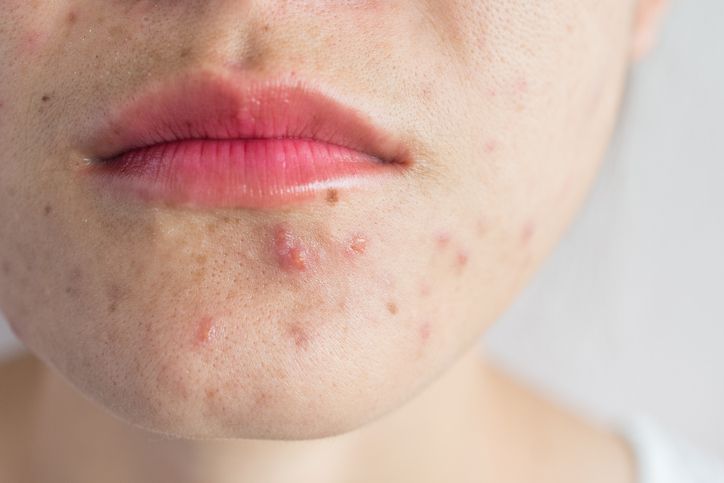
As a result of clogged hair follicles beneath the skin, acne appears as a skin disorder. Dead skin cells and sebum which is an oil that helps prevent skin from drying out, clog pores in dry skin, causing lesions to appear, often known as pimples or zits. The eruptions typically affect the face, but they can also affect the back, chest, and shoulders.
Although it can happen at any age, it frequently happens during puberty when the sebaceous glands are active. Although it is not harmful, it may result in skin scars. Male hormones released by the adrenal glands in both males and females stimulate the glands, which then create oil. Between the ages of 12 and 24, at least 85% of persons suffer from hormonal acne alone.
Who normally gets acne?
Acne affects people of all ethnicities and ages, but it is most prevalent in adolescents and young adults. Males are more likely to get acne than females during the teenage years. Acne can persist into adulthood, and when it occurs, women are more likely to experience it.

2
Causes of acne
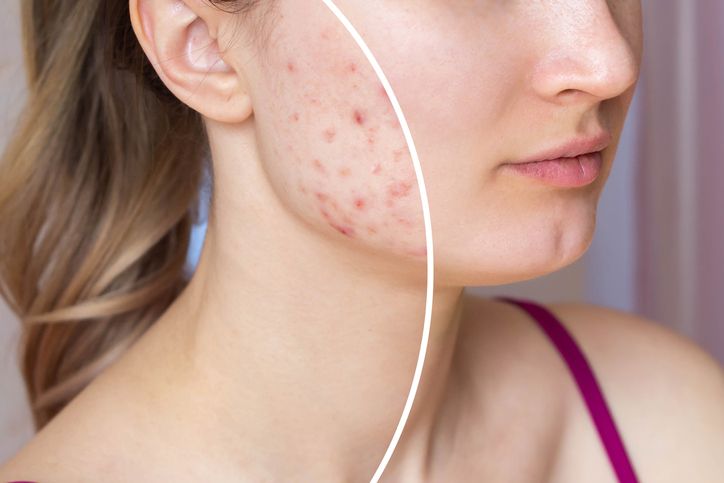
Hormone
Acne may result from an increase in androgens, or male sex hormones which are also called hormonal acne or adult acne. They typically rise during puberty in both boys and girls, causing the sebaceous glands to grow and produce more sebum. Acne can also be brought on by pregnancy-related hormonal changes.
Family History
If either of your parents had acne, researchers think you could be more likely to as well.
Medications
Acne can be brought on by some medicines, including hormone-containing, corticosteroid-containing, and lithium-containing ones.
Age
Acne can affect anyone at any age, although teens are more likely to have it.
Read More

3
Acne Treatment - New Beauty
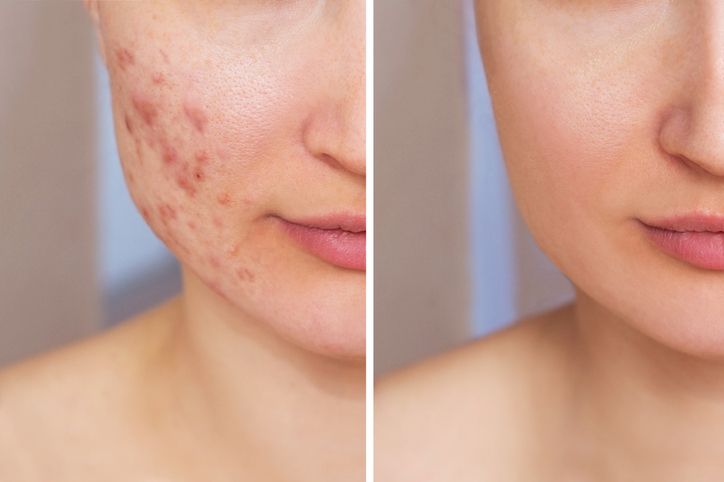
New Beauty introduces a treatment designed for acne-prone skin which is The Acne Treatment. First, dual spiral suction and drainage technology simultaneously removes dead skin cells and clogged pores to soothe acne inflammation and infections.
A moisturizing serum is then infused into the skin to balance sebum secretion and boost collagen production. Without excess oil, future breakouts are unlikely. Acne treatment is intended for pimples, blemishes, pimples, comedones, pimples, enlarged pores, dehydrated skin, and acne scars and dull skin tone.
Benefits if this treatment
Removes Dead Skin Cells: Dual spiral suction and drainage technology removes excess dead skin cells to prevent future clogged pores.
Hydrating Essence: A medical-grade moisturizing serum soothes acne-prone skin by penetrating the innermost layers of the skin to hydrate and nourish skin tissue.It also soothes the sebaceous glands to produce excess sebum. prevent.
Visible Results: As treatment progresses, acne breakouts, acne scars, and other forms of acne will appear less. Experience less oil and brighter, plumper, hydrated, and healthier skin!
Non-invasive Treatment: Acne treatment is non-invasive. That means no surgery, incisions, injections, acne treatments, or oral antibiotics. Our estheticians have determined that most people with moderate to severe acne are suitable for this treatment.
How does this treatment work?
Step 1: The consultant will explain the theory and procedure of the procedure. A beauty therapist then performs a patch test to ensure there is no irritation reaction to the probe.
Step 2 : A dual spiral suction/drainage probe initiates vacuum microdermabrasion and deep cleansing. The skin and clogged pores are exfoliated to remove dead skin cells, oil and dirt. Without impurities, acne inflammation and infection should slowly subside.
Step 3 : A dual spiral suction/drainage probe initiates vacuum microdermabrasion and deep cleansing. The skin and clogged pores are exfoliated to remove dead skin cells, oil and dirt. Without impurities, acne inflammation and infection should slowly subside.
What can you expect after the treatment
Reduced acne scars: Acne treatments are intended for acne-prone skin. Vacuum microdermabrasion unclogs pores, reduces inflammation, and speeds up the fading of acne and acne scars.
Fewer acne breakouts: This treatment hydrates the skin, stimulates collagen production, calms sebum secretion, and reduces the appearance of blackheads and blackheads during acne treatment.
Safe and non-invasive treatment: Acne treatment is a non-invasive, low-risk treatment. This procedure has no incisions or needles, no scars, and is painless for most users compared to other treatments.
Professional and caring service: Your therapist will follow up with your feedback once your acne treatment is complete. Our beautician will put together the best treatment plan for you to achieve maximum treatment results

4
Light Therapy
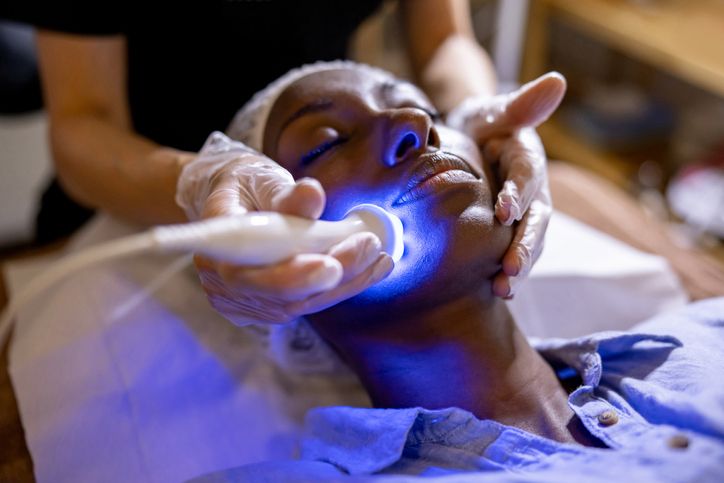
Dermatologists have utilized visible light devices that kill skin bacteria as an alternate acne treatment for the past 20 years. Light therapy, often known as blue light, red light, or phototherapy, is an evidence-based treatment that is generally safe and has few negative effects.

Book Now to Experience
Acne Treatment
1 Minute Self-Registration
Date should not be before minimal date

5
Nonprescription Treatment for Acne
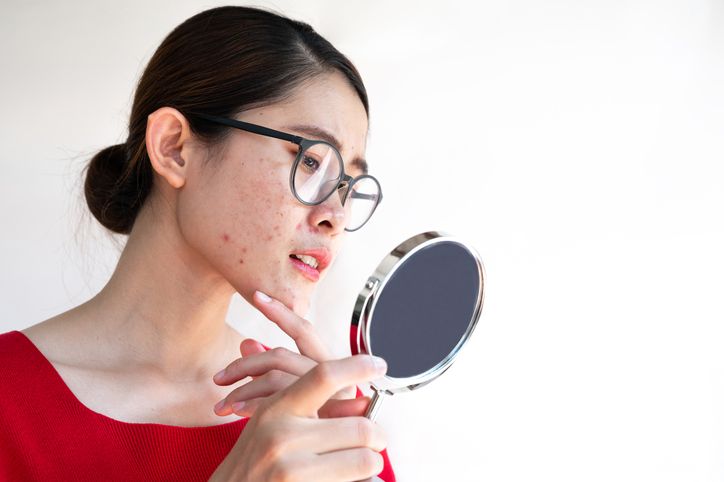
Benzoyl peroxide
For mild acne, you can try treatment with over-the-counter medications containing benzoyl peroxide or ask your doctor to recommend it. This compound is thought to work by destroying the bacteria associated with acne. It usually takes at least 4 weeks to work and requires continuous use to keep acne at bay.
Like many over-the-counter and prescription medications, it does not affect sebum production or shedding of hair follicle cells which causes acne to return when the use is stopped. Creams, lotions, detergents, mousses, cleansing pads and gels.
Salicylic acid
On the skin, salicylic acid helps correct abnormal shedding of cells. For mild acne, salicylic acid helps unclog pores and loosen and prevent lesions. It does not affect sebum production and does not kill bacteria. Just like benzoyl peroxide, it becomes ineffective when you stop using it, so you have to use it continuously or otherwise the pores will clog again and your acne will return.
Alcohol and acetone
Alcohol has a mild antibacterial effect, and acetone can remove oil from the surface of the skin. These substances are found in over-the-counter acne treatments. These may dry out the skin and can have little or no effect on acne, and are generally not recommended by dermatologists.
Herbal medications
To treat or prevent acne, a variety of herbal, organic, and natural remedies are sold. These agents' efficacy has not been established, and they are not expected to be very helpful.

6
Prescription Treatments for Acne
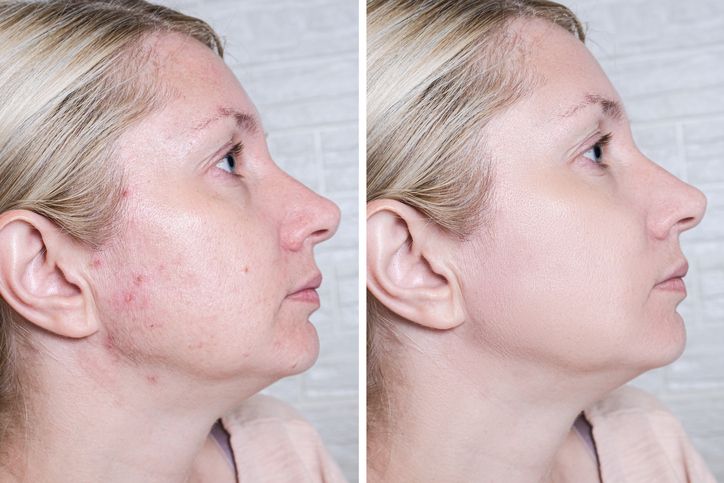
Antibiotic
It can be applied to the skin (topical) or taken orally (systemic). Antibiotics work by ridding the skin of acne-causing bacteria and reducing inflammation. There are a variety of topical products, including creams, gels, solutions, pads, foams and lotions. Topical antibiotics have a limited ability to penetrate the skin and remove deeper acne, while systemic antibiotics circulate through the body and enter the sebaceous glands. Systemic antibiotics can be used for more severe forms of acne, although they frequently have greater adverse effects than topicals.
Topical antibiotics are generally not recommended as acne treatment alone, as they may increase the risk of antibiotic resistance in skin bacteria. Likelihood may decrease. Some of the topical antibiotics with anti-inflammatory properties are erythromycin (Akne-Mycin, ATS, Erycette, Erygel, and Ilotycin), clindamycin (Cleocin T, Clinda-Derm), and topical clindamycin (Cleocin T, Clinda-Derm). They should always be administered directly to the skin together with benzoyl peroxide or a topical retinoid.
Retinoids or vitamin A derivatives
Topical retinoids clear moderate to severe acne by affecting skin growth and shedding. It can be used in combination with other acne products such as benzoyl peroxide and oral antibiotics. Since topical retinoids don't have the negative consequences that oral retinoids do, they shouldn't be used by expectant or nursing mothers. Topical retinoids can cause skin irritation, dryness, and redness. The most successful treatment for severe cystic acne is isotretinoin (Absorica, Accutane, Amnesteem, Claravis, Sotret, Zenatane).
Even mild or moderate acne that hasn't responded to other treatments can frequently be cleared by it. The product may, however, have unwanted effects. It must NEVER be used by a woman who is pregnant or who is not taking contraception as it might cause severe birth abnormalities. In addition, a lady who is nursing shouldn't take it. According to some research, using it may increase your risk of developing inflammatory bowel disease, depression, and suicide.
Azelaic acid
Another topical drug is azelaic acid, which comes in gel, cream, or foam form and has antibacterial and anti-inflammatory properties. It is often used for another type of condition called rosacea, but it can also help with mild acne.

7
Treatments for acne scars
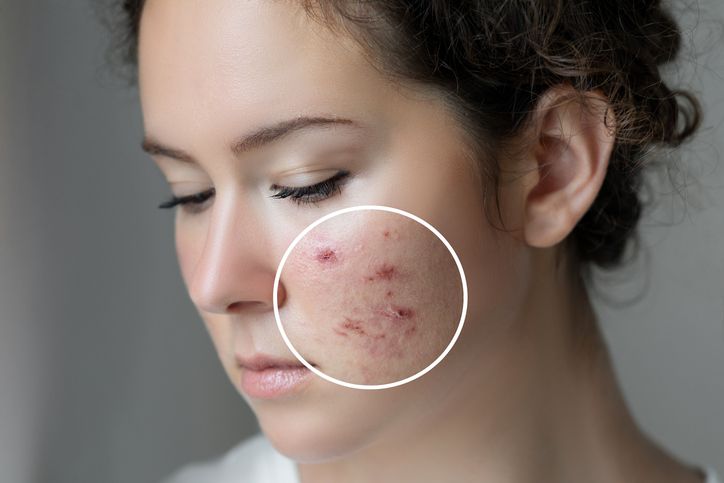
Scars can be improved by several relatively aggressive surgical treatments. The scarred surface of sensitive skin can be exposed by means of procedures including chemical peeling, dermabrasion, and various types of lasers. Moreover, dermatologists might employ the following:
* Microneedling to increase collagen and make scars look less noticeable. * A needle is inserted under the scars during subcision to separate them. * Injecting fillers under scars helps raise them above the surrounding skin surface.
Microdermabrasion has little effect on acne by itself, but when combined with a laser, it can be effective. Before considering treatment, it is important to discuss the procedure, necessary precautions, and expected results with your doctor.

8
How to prevent acne
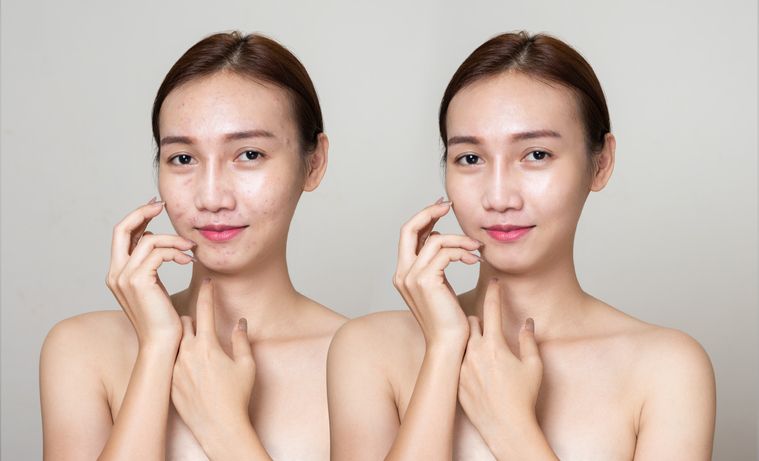
Take care of your skin
Moisturizers help to keep the skin hydrated and can make a big difference for acne-prone skin. When skin gets too dry, it secretes sebum (sebum) to compensate for the dryness and, as mentioned above, excess sebum can cause acne. However, many moisturizers that contain oils, synthetic fragrances, or other ingredients can irritate your skin and cause breakouts. Before buying a moisturizer, always check the ingredient list.
Don't touch your face
Touching your face can transfer bacteria and pore-clogging impurities to your skin. Avoiding touching your face can be difficult, but be mindful of how often you touch your face and avoid it as much as possible. It may seem virtually impossible to resist the pressure of a life-sized whitehead on the tip of your nose, but it's best to avoid them without touching them.
Pimples often bleed, but they can get worsened by inflammation, clogging of surrounding pores, and scarring.
Healthy diet
Reducing your intake of the foods such as processed food, dairy products, alcohol, refined sugar or adopting an anti-acne diet can help reduce breakouts. You can try an elimination diet to identify. It's best to speak with a nutritionist before starting any new diet to ensure that you're still getting the recommended number of calories and nutrients for your needs.

Book Now to Experience
Acne Treatment
1 Minute Self-Registration
Date should not be before minimal date

9
Conclusion
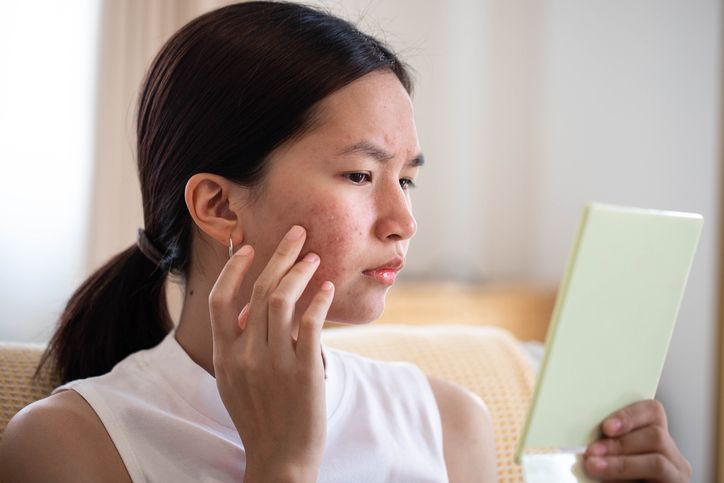
Most people get pimples all the time. Prevention efforts can help, but are not guaranteed. There are many factors that cause acne, including hormones, stress, genetics, and diet and some drugs can even cause outbreaks.
Depending on your age, gender, and acne severity, among other things, there are several treatment options available. Topical creams or gels can be used to treat acne that is mild or moderate. More inflammatory acne may respond well to oral antibiotics or birth control pills but remember to have a doctor's descriptions. Make an appointment with a doctor if over-the-counter acne medications and mild face washing don't work for you and find a more effective solution in treating acne.
FAQ
Pregnancy acne: What Is It?
Pregnancy acne is a skin rash in pregnant women that can be caused by hormonal changes. The elevated hormone levels in the first trimester are the primary factor in pregnancy-related acne. Acne is common during pregnancy. In fact, more than half of pregnant women can be expected to develop acne.
Can cystic acne be prevented?
Acne cysts are brought on by blocked pores that swell and become irritated. By taking care of your skin and using the right clogged pore treatments, you can take steps to lower your risk of getting cystic acne. Cystic acne is more difficult to treat at home. Therefore, if you think you have this type of acne, we recommend that you consult a dermatologist or other medical professional.
How crucial is washing your face?
Seldom is having acne due to improper face washing. In actuality, a lot of acne sufferers overwash their faces. Over-washing your face occasionally can exacerbate problems. Scrubbing too vigorously could make your acne worse. Moreover, some astringents with alcohol in them can overly dry your skin. In light of this, it is wise to wash your face every night with water and a mild cleanser. Nevertheless, the majority of acne instances call for more than just washing your face.

Book Now to Experience
Acne Treatment
1 Minute Self-Registration
Date should not be before minimal date
Recommended Articles
COPYRIGHT© NEW BEAUTY MANAGEMENT LIMITED 2026. ALL RIGHT RESERVED.




